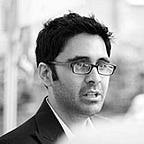Love and Responsibility
The Hurricane and the Butterfly
Of the many assumptions that defines us now is the idea of “taking responsibility”. It’s everywhere, a foundational belief: you see it in economics, politics, pop psychology, read every day in every newspaper, repeated endlessly until you just believe it.
It’s also one of the most foolish ideas in human history. So foolish, in fact, that I’ll disprove it in three sentences.
You’ve heard the story of the butterfly and the hurricane. You are the butterfly, and life is the hurricane. How can you ever take responsibility for all your actions?
You can’t. If you could, you’d be omniscient and omnipotent.
How can you take responsibility for all your thoughts? They spring unbidden from somewhere you don’t know, don’t they? You can’t control them, and yet they control your actions, don’t they?
Therefore, the desire to “take responsibility” tells us a very great deal about the broken and traumatized psyche that demands it. It masks a desire to be gods, to be omnisicient and omnipotent. But that is the very definition of hubris, is it not? That is what Icarus wanted, too. And that is why he fell.
So we can never take responsibility in this absolute sense. In fact, love is the very opposite of demanding responsibility.
To love someone is to admit their humanity, their fallibility. Yet when we say “take responsibility”, we are saying: be a god! So we are denying the essence of their humanity, which is that with our imperfect minds and broken hearts and fragile hands, this life is never clay in our hands. It is the hurricane, and we are just the butterfly.
To really, genuinely, love someone isn’t to demand then that they take responsibility. What is it? It is to see why they haven’t. How they couldn’t have. That reveals the truth of a person. Not their deficiencies — but the broken parts which make them whole.
I will give you my own example. The sunlight can kill me. Am I to take responsibility for a sunny day? It’s funny to even ask. To see me is to know why I cross the street when there is shade — not to demand that I stand in the sunlight. To love someone genuinely is to see them purely, and that means seeing the very imperfections that have limited them from taking the responsibility that only the gods can know, have, accept.
And love, too, means taking responsibility for people. Not in an absolute sense. Not in a foolish and sentimental way. But in a way that lifts them up. If no one had taken any responsibility for you, what would you be? You would not be the butterfly. You would still be the caterpillar, wouldn’t you? Who educated you, taught you, nurtured guided you, mentored you, helped you, stood by you? All that was taking responsibility for you.
Love is a lever that lifts human hearts up into the sunlight. Love is a miracle that produces life from dust.
Here is a great secret.
The butterfly doesn’t produce the hurricane. The hurricane produces the butterfly.
Doesn’t it?
The hurricane contains the wind and the rain, which nurture the seeds, which grow the trees, on which the caterpillars nest. And so the hurricane causes the butterfly before the butterfly causes the hurricane.
So it is with you. Before you were the butterfly, there was the hurricane. No one who genuinely loves can or should ask you: “what hurricanes have you caused! Why didn’t you stop them?”. They do not really know the truth of love.
The hurricane produces the butterfly. You are causing infinite things in the world, in being, with your every tiny action. With every thought, in fact, because your thoughts are your actions before they happen. All those infinities ripple out from you like great waves in this pure ocean of being.
But you are not a god. You are just a butterfly. You cannot even see the horizon. You can only see the impossible beauty, the aching truth, of this day. Do not try to be anything else. Isn’t that beauty, truth, that miracle enough?
That is why you must do everything with love, and that is why everything done with love doesn’t ask for responsibility. It asks for something greater.
It asks for grace.
Umair
May 2017
